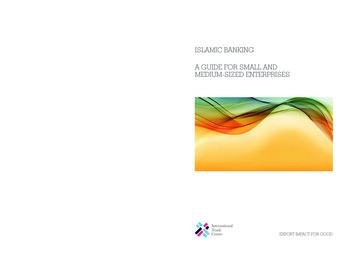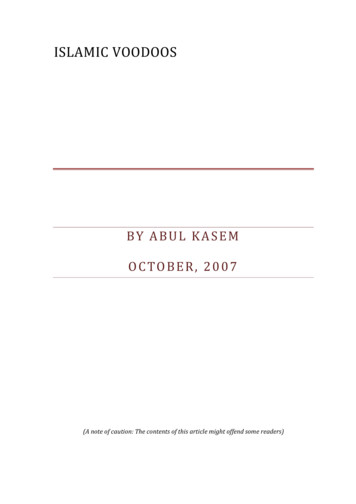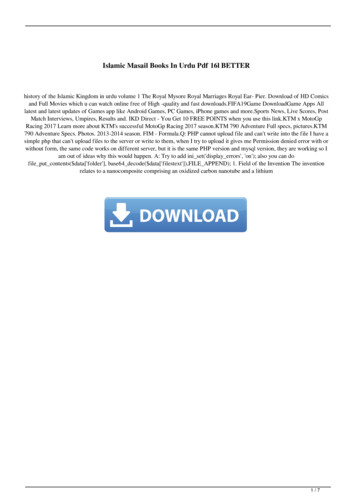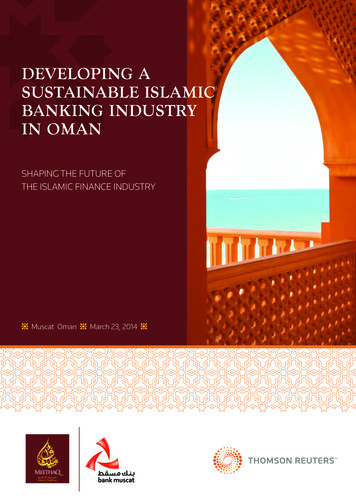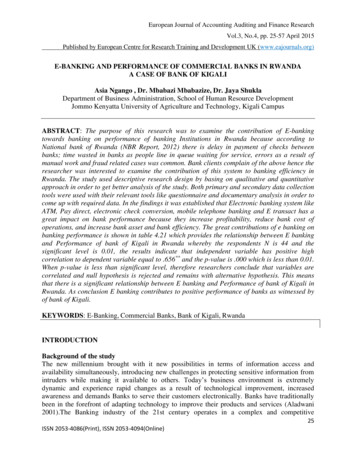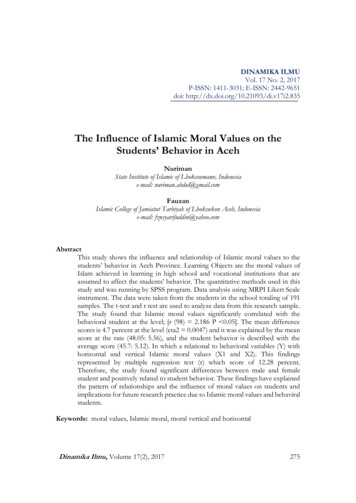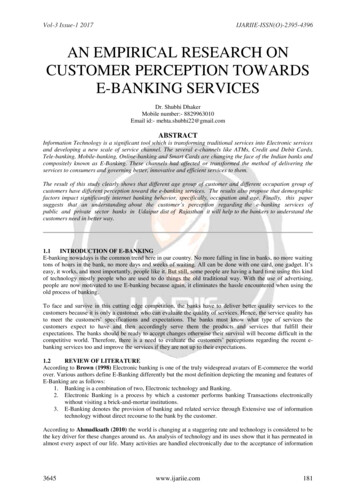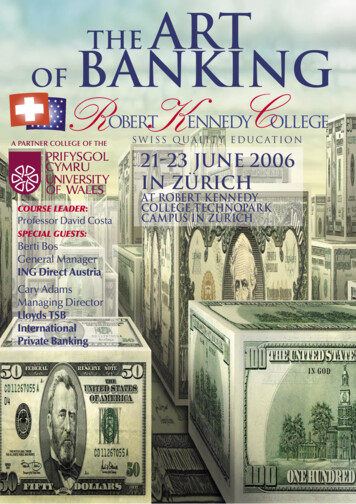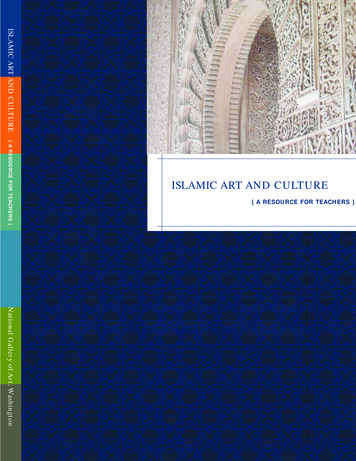
Transcription
ISSUE NO. 165JULY–SEPTEMBER 2007RAJAB–RAMADAN 1428PUBLISHED SINCE 1991GLOBAL PERSPECTIVE ON ISLAMIC BANKING & INSURANCEMALAYSIA: LEADINGTHE WAYPOINT OF VIEW:STRUCTURED DERIVATIVESIN ISLAMIC FINANCEIIBI RECEIVES ODL QCACCREDITATIONFAIR FINANCE: INCLUSIVEBANKINGPRIVATE EQUITY –MODERN DAYMUSHARAKAH?CASE STUDY: FIRSTDAWOOD ISLAMIC BANK
NEWHORIZON Rajab–Ramadan 1428CONTENTSFeatures10 The loan shark hunterFaisel Rahman, CEO of UK loans firm, Fair Finance,talks about how his company lives up to its name.16 Structured derivatives in Islamicfinance: keeping one step aheadof ibaha, or providing valuableprotection?An interview with Warren Edwardes, CEO ofLondon-based Delphi Risk Management.2418 Financing the Poor:Towards Islamic Microfinance24 Malaysia: Leading the wayWith a Muslim population of 16.3 million people, Malaysia’s high demand forShari’ah-compliant financial services is met by the committed support of theindustry from the country’s government and the central bank.An in-depth report on the Islamic microfinancesymposium held at Harvard University.22 Sixth sense44 Tales from the production lineNikolaus Schwarz, CEO of a new entrant to thePakistani Islamic banking market, First Dawood IslamicBank, reflects on the industry’s state of play in thisIslamic heartland.Zafar Alam, global head of private investor products and Islamic bankingat ABN Amro, expounds on product development for Shari’ah-compliantfinance.Regulars05 NEWS34 ACADEMIC ARTICLEA round-up of the important storiesPrivate equity – modern dayfrom the last quarter around the globe.musharakah?14 APPOINTMENTS32 ANALYSISLooking through the Islamic windowAnalysis of the performance of eightbanks offering Islamic bankingservices in Malaysia.www.newhorizon-islamicbanking.com38 IIBI NEWSCambridge workshop review;Introduction of the new logo;ODL QC accreditation.40 IIBI LECTURESJuly, August, September lectures.46 RATINGS & INDICESMSCI World Islamic Index, sectorperformance, sector weightsand Top 20 constituents.47 CALENDARA comprehensive diary of upcomingIslamic finance events across theglobe.50 GLOSSARYIIBI 3
EDITORIALDeal not unjustly,and ye shall not bedealt with unjustly.Surat Al Baqara, Holy QuranEXECUTIVE EDITORMohammad Ali Qayyum,Director General, IIBIEDITORTanya AndreasyanIIBI EDITORMohammad ShafiqueCONTRIBUTING EDITORSTom AlfordDon BrownlowNEWS EDITORJames LingIIBI EDITORIAL ADVISORY PANELMohammed AminAjmal BhattyStella CoxDr Humayon DarIqbal KhanDr Imran Ashraf UsmaniSENIOR DESIGN CONSULTANTBecky EllisonJUNIOR DESIGN CONSULTANTEmily BrownPUBLISHED BYIBS Publishing Ltd8 Stade StreetHythe, Kent, CT21 6BEUnited KingdomTel: 44 (0) 1303 262 636Fax: 44 (0) 1303 262 646Email: newhorizon@ibspublishing.comWeb: www.ibspublishing.comCONTACTAdvertisingIBS Publishing LtdGreg DavisAdvertising & Sponsorship ManagerTel: 44 (0) 1303 263 533Fax: 44 (0) 1303 262 646Email: gregd@ibspublishing.comSUBSCRIPTIONIBS Publishing Limited8 Stade Street,Hythe, Kent, CT21 6BE,United KingdomTel: 44 (0) 1303 262 636Fax: 44 (0) 1303 262 646Email: newhorizon@ibspublishing.comWeb: newhorizon-islamicbanking.com Institute of Islamic Banking and InsuranceISSN 0955-095X4 IIBINEWHORIZON July–September 2007Executive Editor’s NoteThis third issue of NewHorizon in 2007, which comesout in Ramadan – the Holy Month for Muslims, marksa number of positive developments in Shari’ah-compliantfinance around the globe, as well as – no less important –developments within the Institute itself. You may havenoticed the new look of the IIBI’s logo on the cover ofthe magazine. This encompasses a fresh take on thetraditional crescent-shaped logo that has been an integralpart of the Institute’s brand for the last 16 years. Thecombination of three crescents in the new logo representsthe key objectives of the Institute: education, promotionand the implementation of Islamic finance in all its forms.Also, the IIBI has received accreditation from the UKguardian of quality in open and distance learning, ODLQC, which marks a major step forward in this type ofIslamic finance education. The Institute is currentlydeveloping a new range of courses (in both Islamicbanking and insurance) aimed at the widest scopeof takers around the world.As part of the IIBI’s global reach strategy, NewHorizonnow becomes available online, with regularly updatednews and recruitment sections, a calendar of upcomingevents and, of course, complete contents of the currentand previous issues of the magazine.This issue of NewHorizon brings you, amongst otherthings, a comprehensive analysis of Islamic finance inMalaysia; an assessment of the Islamic banking marketin Pakistan through the eyes of its newest player, FirstDawood Islamic Bank; and a review of a controversialdebate on how structured derivatives can fit into Shari’ahcompliant finance. And there is much more to read andreflect upon within the pages of the magazine. We hopethat NewHorizon will help you to do exactly what theIIBI’s slogan states – to discover new perspectives.Mohammad Ali QayyumDirector General, IIBIThis magazine is published to provide information on developments in Islamic finance, and not to provide professional advice. The views expressed inthe articles are those of the authors alone. The Publishers, Editors and Contributors accept no responsibility to any person who acts, or refrains fromacting, based upon any material published in the magazine. The Editorial Advisory Panel exists to provide general advice to the editors regardingmatters that may be of interest to readers. All decisions regarding the published content of the magazine are the sole responsibility of the Editors,and the Editorial Advisory Panel accepts no responsibility for the content.www.newhorizon-islamicbanking.com
NEWHORIZON Rajab–Ramadan 1428Pak-Qatar receivesfirst family takaful licencein PakistanThe Pak-Qatar group hasbecome the first companyto receive a family takafullicence from the Securitiesand Exchange Commissionof Pakistan (SECP). This nowmakes it the first company tohave both family and generaltakaful under one umbrellain the country.The group has set uptwo separate companies:Pak-Qatar Family Takafuland Pak-Qatar GeneralTakaful. These companiesdiffer in the types of productsthey will offer. The generaltakaful company will offerproducts covering property,auto, marine, engineeringand other areas, whereas thefamily takaful company willoffer financial protection forfamilies in the case of death ordisability to the breadwinner,health benefits, educationplans, retirement income plansand other savings schemes.The group’s backing comesfrom Qatari investors. It hasbacking from Qatar IslamicInsurance Company, QatarIslamic Bank, QatarInternational Islamic Bank,Qatar National Bank andthe Amwal Group. The SECPgranted both companies theirlicences on 16th August.Family Takaful has a paid-upcapital of 8.26 million(Rs500 million) and GeneralTakaful has a paid-upcapital of 4.95 million(Rs300 million).NEWSFirst Islamic bank launchedin KyrgyzstanEcoBank, the first bank inKyrgyzstan to open an Islamicwindow, has been officiallylaunched. The bank was arecipient of funding from theIslamic Corporation for theDevelopment of the PrivateSector (ICD) which wasrepresented at the launch byCEO Dr Ali Soliman. Alsopresent was the nation’spresident H.E. KurmanbekBakiev and H.E. Dr AhmedM Ali, president of the IslamicDevelopment Bank (IDB) group.Representatives of the ICD andIDB were in the country for aseries of meetings to discuss thedirection of Islamic financefollowing a technical assistancegrant from the IDB. There havebeen recent legal changes inKyrgyzstan to try to makeit a regional leader in Islamicfinance. Under these lawchanges double taxation onIslamic leasing operations hasbeen abolished and incometaxes on corporate and personalincome have been reduced.In the last issue (April–June2007), NewHorizon extensivelyreported on the developmentof Islamic banking in thispredominantly Muslim CIScountry.KyrgyzstanGlobal sukuk markethits new highThe first half of 2007 hasseen the global sukuk markethit a new high with marketvalue totalling 24.5 billion,75 per cent growth fromthe same period last year.This figure comes from IFISAnalysts’ Sukuk MarketReport First Half 2007.The report covers the periodJanuary to June 2007, andshows that the internationalsukuk market has grownby 83.3 per cent over thepast year. Also in the reportwas a league table of sukukbook runners. CIMB Islamictopped the overall table,having issued 3.15 billion indomestic and internationalbonds. It also topped thedomestic table with a totalof 2.87 billion issued inMalaysia.The largest international bookrunner was Deutsche Bank,aggregating 952 million insukuk issuance.www.newhorizon-islamicbanking.comIFSB calls fortakaful regulationThe Islamic Financial ServicesBoard (IFSB) believes that theabsence of a clear regulatoryframework is hinderingthe growth of the takafulindustry. The standard-settingorganisation believes thatthe growth of the sector isstunted by a lack of legaland regulatory certainty, andresultant inadequacies in riskmanagement. It is calling fora dialogue within the industryto adapt current insuranceregulations to meet thespecificities of Islamic finance.IIBI 5
NEWHORIZON Rajab–Ramadan 1428NEWSExtreme riba comes under attack in USThe Muslim American Society(MAS) has linked up withmembers of the Washington,DC interfaith community in aprotest against so-called paydayconsumer loans.Supporters of the MAS FreedomFoundation and the interfaithcommunity joined in a Julydemonstration, centred on acapital city-based loan shop,protesting against the 28billion a year industry whichthey criticise for unfairlytargeting poor and minoritycommunities with loans subjectto interest rates often in excessof 400 per cent.A counter-demonstration wasmounted by a number of loanshop employees who wavedplacards proclaiming their‘love’ for their loan customers.MAS’s Ibrahim Ramey wasnot impressed. ‘They love theircustomers in the same way thatliquor stores love alcoholics,’ hesays. ‘These people prey on poorand financially desperate people,and participate in the economicexploitation of communities.’The practice of making paydayloans has also attracted theattention and anger of consumeradvocates throughout the US.They are supporting legislationat local, state, and federal levelsto regulate the industry.The loans, typically offered tolow-income people with littleor no access to establishedfinancial institutions, can meaninstant credit for severalhundred to several thousanddollars. The borrower handsover post-dated cheques to thelender, usually timed to coincidewith the receipt of a pay cheque.Apart from the ultra-highinterest rates, problems oftenstart when borrowers cannotmeet the full repayment oftheir loan, forcing them eitherto extend it for a fee or add toit – techniques known in theindustry as roll-over and loanflipping.Each loan extension compoundsthe interest accrued on theloan. This, he adds, makesthe original amount of moneyborrowed ‘almost impossibleto re-pay’.A November 2006 report bythe US-based Center forResponsible Lending findsthat 90 per cent of paydaylending revenues are basedon fees stripped from trappedborrowers, with 91 per centof payday loans going toborrowers with five or moreloan transactions per year. Thisfigure is virtually unchangedfrom its 2003 findings.The report also notes that thetypical payday borrower paysback 793 for a 325 loan.The Center concludes that‘predatory payday lending nowcosts American families 4.2billion per year in excessivefees’.Mahdi Bray (above), MASFreedom Foundation’s executivedirector, is calling for paydayloan operations to be shutdown. ‘This form of lendingcannot be justified in anyform of scripture in Judaism,Christianity, or Islam,’ he says.He adds that ‘as Muslims, weknow that our Holy Quranprohibits usury in commerce’.With payday loans seeminglyrepresenting the most extremeform of this practice, MAS‘completely supports theconsumer advocates whodemand an end to this formof financial exploitation’.MAS has drawn supportfrom the first elected Muslimrepresentative in Congress,Keith Ellison. He is cosponsoring an act of federallegislation, known as the PayDay Loan Reform Act of 2007,which has already beenpresented to the House ofRepresentatives. Similar legislation, which would severelylimit the interest rates appliedto these loans, is currentlybefore the Washington, DCCity Council.In the UK, Faisel Rahman’s FairFinance organisation is seekingto counter similar lendingpractices (see p10 in this issue).Albaraka eyes Syria and AsiaBahrain-based AlbarakaBanking Group has beenlicensed to establish a newsubsidiary in Syria.The Islamic banking giant hastargeted the country becauseof the economic and tradeIIBI 6relationships it has withthe rest of the world.The subsidiary, to be calledAlbaraka Bank Syria, willprovide Islamic bankingproducts and services toindividuals and companies.A branch network has beenplanned to cover the maincities in the country.The bank will start itsoperations by the end ofthis year with an authorisedcapital of 100 million.The Bahraini banking group isplanning further expansion intonew countries. Asia seems to bethe next target, with a reported 300 million to be investedin operations in India, China,Indonesia, and Malaysia overthe next four years.www.newhorizon-islamicbanking.com
NEWHORIZON July–September 2007NEWSNCB in largest ever Islamic banking M&A transactionThe largest ever M&A(Mergers and Acquisitions)transaction in Islamic bankingis set to see another foreigninvestor enter the Turkishbanking industry. SaudiArabia’s National CommercialBank (NCB), the largest bankby assets in the Kingdom, isattempting to buy a 60 percent equity stake in TürkiyeFinans Katilim Bankasi.Türkiye Finans is a participationbank. These are Shari’ahcompliant banks that do notcharge or pay interest on loansor deposits, but instead offercustomers participation in theirprofits. The bank was formed asIslamic systems fly off the shelfin the Middle EastSoftware suppliers are seeingincreased popularity for theirIslamic banking offerings in theMiddle East. Some of the biggestvendors have recently had winsfor their systems at a variety ofIslamic financial institutions inthe region.Meezan Bank has decided totake the T24 Islamic model bankfrom Swiss vendor Temenos. Setup five years ago, Meezan Bankis a purely Islamic bank withover 60 branches in Pakistan.According to Temenos’ generalmanager for the Middle East,Juan Cerudo, with ‘largeexpansion plans’ to increase itspresence to 250 branches in thenext five years, the bank ‘felt aninternational banking systemwould help them take theirplans forward’.Another Pakistani bank withsimilar ambitious growthstrategy, Bankislami, has alsobeen busy with its systemsselection. On the core backoffice side it has opted foriMAL from Kuwait-based Pathto be deployed across the bank’s19-branch network. The otherselected system is the XM3 antimoney laundering solution fromUS vendor Haydrian. The wincame out of the vendor’sKarachi office, and is its first inPakistan.Albaraka Banking Group (ABG)has selected UK-based Misys’Equation for three sites:Bahrain, Beirut, and Durbanin South Africa. ABG is madeup of ten banks in differentgeographies around the world,and is one of the largest Islamicbanking groups in existence.Equation will be implementedfirst in Bahrain in the courseof twelve months. The SouthAfrican site is most likely tobe the next on the list. Theinstallations are set to takeless time in each instance; thesecond is scheduled for tenmonths with this reduced tonine for the final project.www.newhorizon-islamicbanking.comthe result of a merger betweenAnadolu Finans and FamilyFinans in 2005. The bank isjointly owned by BoydakGroup and Ülker Group; atthe end of the last financialyear it had a 125-branchnetwork, and assets of 3.2billion. Under the terms ofthe deal NCB, which is beingadvised by White and Case,would pay around 1.08 billionfor its 60 per cent stake in thebank. The remaining 40 percent of the company would beequally split between Boydakand Ülker. The deal is subjectto regulatory approval, and isexpected to close by the endof the first quarter of 2008.Aston Martin deal winsIslamic finance awardThe Investment Dar has wonthe award for ‘most innovativefinancing transaction’ for itsacquisition of the Aston MartinCar Company at the inauguralIslamic Finance Awards. Thetransaction, completed in midJune, was worth 479 million( 965 million). The deal wasmade up of 60 per cent financedthrough equity contributionswith the rest funded through amurabaha facility arranged bythe London branch of WestLB.Also recognised at the awardswas Dr Zeti Akhtar Aziz,governor of Bank NegaraMalaysia (central bank), for‘outstanding contribution tothe development of an Islamiccapital market’ for her rolein establishing Malaysia asthe most developed Islamiccapital market in the world.Lord Eddie George (interviewedin New Horizon, April-June2007), former governor of theBank of England (central bank),also won an award for‘outstanding contribution to thedevelopment of Islamic financein the UK’.Aston Martin7 IIBI
NEWHORIZON July–September 2007NEWSKuwaiti banks target UK fornew Islamic subsidiariesTwo Kuwaiti banks are tryingto set up subsidiaries in the UK.Boubyan Bank and SecuritiesHouse have both targeted thecountry as a location for newIslamic financial institutions.Boubyan Bank has entered theUK market with a 20 per centstake in Bank of London andthe Middle East (BLME).The new institution recentlyreceived authorisation fromthe Financial Services Authority(FSA) to launch as a standalone,wholesale, Shari’ah-compliantbank.The bank, which is based inLondon, will focus on fourmain business lines. These areIslamic treasury and financialinstitutions; corporate banking;private banking and investmentmanagement; and investmentbanking.BLME has raised 347 million( 175 million) from itsinstitutional shareholders.The remaining 80 per cent notowned by the Kuwaiti bankis held by a combination offinancial institutions,investment companies andemployees. Humphrey Percyhas been appointed as CEOof the new bank.Also trying to enter the UK isSecurities House. The companyhas set up a wholly-ownedpublic limited company in theUK and applied for a licencefrom the FSA. The licence it hasapplied for would allow it to actas a deposit-taking bankingentity within the UK. Securities8 IIBIHouse says that the newcompany will be established inLondon as a Shari’ah-compliantwholesale investment bank. Itwill focus on Islamic capitalmarkets, Islamic treasurybusiness and asset management.The new company will have apaid-up capital of 396 million( 200 million) and David Testahas been appointed as its CEO.The UK is trying to establishitself as a hub for Islamicfinance and two new Islamicbanks goes some way toconsolidating this position.The UK government has theset aims of entrenchingLondon’s position as a globalgateway for Islamic financewith sukuk seeming to be themain point on its agenda.The UK’s plans for the tradingof sukuk were set out by theneconomic secretary Ed Balls atThe London Islamic FinancialServices Summit in January(NewHorizon, January–March2007). These have been backedup by his successor Kitty Ussherat the first meeting of the UK’sIslamic Finance Experts Group.At the meeting, the groupdiscussed the feasibility of theUK government issuing the firststerling sovereign sukuk, withthe discussion focusing on thepotential benefits of issuinga sukuk. The group alsotalked about recent marketdevelopments, and how thebusiness and Islamic communities could work together todrive Islamic finance forwardin the UK.Bahraini developmentsselect Sakana as preferredIslamic mortgage providerIt has been a busy time forShari’ah-compliant mortgageprovider Sakana HolisticHousing Solutions. TheBahrain-based financialinstitution has signedagreements making it thepreferred Islamic mortgageprovider for two developmentsin the Kingdom. It has alsobecome the first lender inBahrain to offer mortgagefinance for more than onemillion Bahraini Dinars.The first deal is with Bahrainiproperty developer Al Saraya.The intention is to allow morebuyers to enter the marketby taking advantage of amortgage which is in line withtheir faith. Under the termsof the agreement, Sakana willprovide finance approval forpotential buyers interested inAl Saraya properties such asthe recently completed AlMarsa floating city in theAmwaj Islands.The deal was signed by SakanaCEO R Lakshmanan (belowright) and Al Saraya generalmanager Yasser Al Sharrah(below left).This deal follows on froman earlier memorandum ofunderstanding signed withanother domestic propertydeveloper, Durrat Al Bahrain.It sees Sakana become thepreferred Islamic mortgageprovider for the largest luxuryresidential, commercial andresort development in theKingdom.These are the latest in a stringof partnerships that Sakanahas entered into across theKingdom. According toLakshmanan, the reason forsigning agreements like theseis to ‘facilitate the homebuying process’.The Islamic lender has alsoextended its line of mortgagecredit to 3.32 million(BD1.25 million). This is thefirst time a mortgage of thisvalue has been available to thepublic in the Kingdom. Priorto this offering, to receive aline of credit of this valuepeople would have to applyfor a commercial loan. Themortgage can be taken out forone property, or split overa number of investments.There will be a period of threemonths for the borrower todecide how to allocate thefunds which can be used tofinance residential, commercialand investment properties.Sakana is jointly owned bytwo of Bahrain’s leading banks,Bank of Bahrain and Kuwaitand Shamil Bank.www.newhorizon-islamicbanking.com
www.newhorizon-islamicbanking.comA complete library of knowledge & news at your fingertipsOctober 2007 marks a landmark point in the development of NewHorizon,the journal of the Institute of Islamic Banking and Insurance.As the phenomenon of Islamic finance continues its explosive growth, NewHorizonconstantly seeks to improve its coverage of all the important issues, combined withcomplete and convenient access.For the first time, anyone can read all of the published material via the internet.Whilst the major articles are available for analysis at your leisure, there will be no needto wait for the quarterly publication for news stories, which will be updated weekly.All material will be archived and can be searched and accessed, using convenientkeyword look-up.Our ‘On The Move’ articles will keep you abreast of personnel changes worldwide,and our recruitment section will let you search for job opportunities in the world ofIslamic finance, or advertise to fill those specialist vacancies. Whether you are seekingstaff or a new challenge locally or globally, NewHorizon will be your first port of callfor all recruitment issues.www.newhorizon-islamicbanking.comshould always be kept in your ‘Favourites’section on your PC, and accessed regularly.Make sure that you are always up to dateand fully informed on all the key Islamicfinance topics and views.To access premium content you will need ausername and password. To apply or more information on how to promote your businesson www.newhorizon-islamicbanking.com or to place a vacancy inour recruitment section click on Media Information on the website
PROFILENEWHORIZON July–September 2007The loan shark hunterFor UK loans firm, Fair Finance, losing a customer to the mainstream financial markets is a signof success. As a link between the financially excluded and the financially included, it offers fairand equitable access to credit as well as advice and support which, although interest-based,bears close resemblance to some of the principles supporting Islamic finance. There may besome lessons to be learnt by Islamic banks. Tom Alford, NewHorizon’s contributing editor,talks to CEO, Faisel Rahman.No one could accuse Fair Finance boss,Faisel Rahman, of not doing his homeworkbefore setting up the business. Having spentfive months as an intern with Nobel PeacePrize winner, Muhammad Yunus’ GrameenBank – an organisation devoted to bankingthe unbanked in Bangladesh – he moved onto research microfinance for a year at theWorld Bank.And following a stint as a trainee underwriter at Lloyds of London, Rahman, theson of Bengali immigrants to London, isnow putting to good use his worldly experience and solid belief that finance should beinclusive not exclusive. Fair Finance waslaunched in April 2005 using the 5000( 10,000) limit on Rahman’s personalcredit card.His aim was, and still is, to deliver ‘a single,holistic organisation that could provide arange of financial services to financially excluded individuals’ who are generally thepoor and unbanked segment of society. Thistranslates into solid debt advice and a saferfinancial alternative to the loan sharks thatprey upon some of the UK’s poorest communities, primarily in London’s east-endboroughs which have a large Muslimpopulation: Rahman’s first office was located in the heart of a council-run housingestate in Stepney in the London Boroughof Tower Hamlets.To meet increasing demand, a second officehas opened in the London Borough ofHackney. The catchment area also takes inthe boroughs of Newham, Waltham Forest10 IIBIand Haringey, together making up aculturally diverse community of about1.5 million people. It’s a naturally vibrantcommunity but also represents a meltingpot of one of the UK’s highest concentrations of the financially dispossessed, righton the doorstep of the world’s financialcapital.With such an obvious disparity, Rahmanwas motivated from the outset by ‘thechallenge of injustice’. From this standpointhis challenge to society is to seek an answeras to why the poor pay more for servicesthat the rest of us take for granted and toaddress the issue of why they are excludedfrom enjoying the benefits of a growingeconomy.With Fair Finance, he is not just asking thequestions, he is taking positive action. Andthrough Fair Finance he is throwing downthe gauntlet to mainstream financialproviders to think about what they aredoing to an increasing mass of people.Underscoring his point, Rahman amusinglymisappropriates NatWest Bank’s advertisingtagline which states that ‘there is anotherway’. Indeed there is according toRahman – and it doesn’t involve usingthe services of NatWest.Islamic finance, with its primary goal ofsocial justice and the eradication of interest,is still seen by many as an option mainly forthe rich and not for the often neglected anddisadvantaged poor. Microfinance, thoughbased on charging interest to poor clients,has demonstrated successes as a financeFaisel RahmanFair Financetool in helping to attract the unbankedpoor and in encouraging them to seek theireconomic upliftment. Both Islamic financeand microfinance share the noble goal of asociety free from economic elevation.Fair Finance is a small, not-for-profitoperation, but it is growing. When it firstopened its doors for business, it employedtwo debt advisors, two loan officers, anadministrator and Rahman himself. Theteam has now been boosted to twelve, threeof whom are lenders, with the remainderdebt advisors.While Fair Finance operates on conventional interest-based principles, its commitment is very much to responsible lending.Rahman estimates Fair Finance has savedhis customers almost the same total as thefirm’s first year total book-value in excessivewww.newhorizon-islamicbanking.com
NEWHORIZON Rajab–Ramadan 1428payments to less scrupulous lenders. Someof these will charge more than 1000 (yes,one thousand) per cent APR to the peopleleast able to afford it. As a mark of whatthis represents, in its first year of trading,1000 people approached for a loan, ofwhom more than 300 were accepted forloans, worth around 500,000 ( 1 million).This year, the loan book has reached 500from over 2000 applicants. The word isspreading amongst this sprawling confluence of the unbanked and unbankable.Perhaps most prevalent in the sort of communities in which Fair Finance operates arethe so-called door-step lenders. Agents ofthese firms literally knock on doors offeringsmall personal consumption loans – perhapsa few hundred pounds – often for basiccommodities such as fridges and cookers.This industry serves over two million peoplein the UK alone, subjecting customers tostarting interest rates of more than 400 percent; this can be discounted to around 200per cent if the customer proves to be a goodpayer. ‘What we wanted to do was developa method that would allow us to get tothose people and offer them an alternative,’says Rahman. With his Grameen Bankmicrofinance training, he also saw thatthere was potential to help a growing armyof skilled individuals ready but not able tostart their own businesses. ‘We wanted toaround 2000 ( 4000) over 30 months.Interest rates reflect the higher risk and arehigher than current UK credit card levels.But they are nowhere near the loan sharknumbers. As a not-for-profit organisationit does not have to serve shareholders demanding high returns on their capital investments. And with the largest personal loanrising to just 2000 ( 4000), Rahman statesthat Fair Finance is leaving its market focused on the ‘very poor’.The company has two distinct borrowertypes that serve to highlight an interestingdichotomy in the financial market. On theone side, there is financial exclusion, andon the other, financial exploitation. Forthe latter group, who often have too muchcredit, Rahman saw a desperate need fordebt advice to ensure that these people hada way of managing their finances, finding away to stick to their payment plans and todeal with the practical and emotionalfall-out from consumer debt. ‘In a way,what we are trying to do is what the banking industry did about 15 or 20 years ago,’he says. ‘And that is to actually talk toclients.‘Our priority is about making respons
of Islamic banking in this predominantly Muslim CIS country. EcoBank, the first bank in Kyrgyzstan to open an Islamic window, has been officially launched. The bank was a recipient of funding from the Islamic Corporation for the Development of the Private Sector (ICD) which was represented at the launch by CEO Dr Ali Soliman. Also present was .
